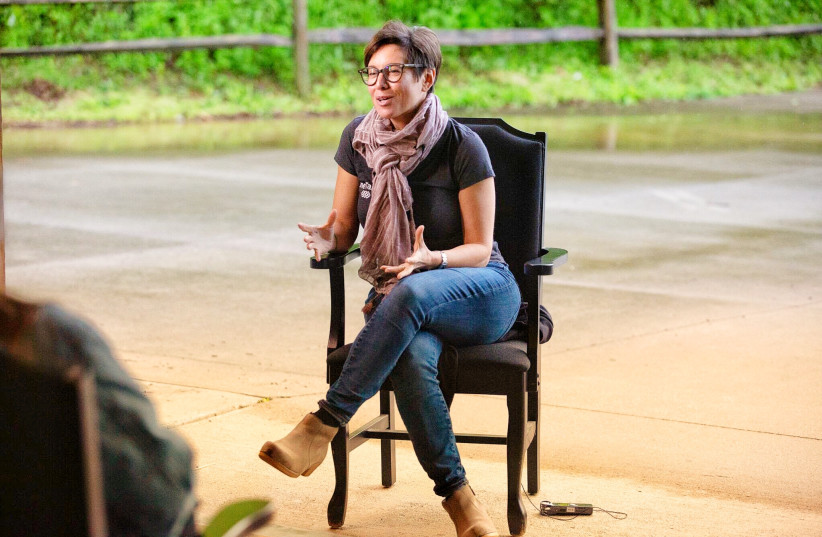Across the US, people in their twenties and thirties are struggling. The pandemic, financial strains, gun violence, social media, hyper-politicization, and polarization around nearly everything has led to a young adult population that is more stressed and more socially isolated than ever, according to the American Psychological Association.
There’s no single cure for these challenges – which affect young adults more significantly than other age cohorts – but there are ways to mitigate young adults’ feelings and negative experiences around them.
This is one of the reasons I co-founded an organization called OneTable, which draws on the ancient Jewish ritual of Shabbat to empower young adults to both create and connect to Friday night dinners with their peers.
It turns out that these few hours of dedicated space and time make an impact. Insights from new research conducted by the Benenson Strategy Group, “Craving Connection: Researching OneTable’s Impact,” show the power of the weekly ritual as a vital space for building personal connections, strengthening mental health and mitigating loneliness.
Prior research shows that relationships and connections help people live longer. For anyone who cares about supporting young adults, these findings offer a pathway forward and are a call to find more ways to create these opportunities.

A DIY approach
Our philosophy is that Shabbat dinners can be almost anything that an individual wants them to be. At OneTable, we provide guidance and resources, but young adults, imbued with a DIY approach, create dinners in ways that authentically reflect them and their guests.
The Shabbat dinner alone is a win for connections; young adults who have hosted or been guests at a dinner through OneTable overwhelmingly say that they’ve become closer with people and “felt less lonely.” Importantly, the dinners are a starting point for new friendships – nearly one in three guests we surveyed met up again with someone they met at dinner.
Beyond these benefits of friendships and social connections, we’ve learned that Shabbat dinners are a gateway to more meaningful and ongoing Jewish experiences. Seventy-five percent of dinner participants say they continue to celebrate Shabbat when they wouldn’t have otherwise – and that’s especially true of participants who did not have a regular Shabbat practice growing up. In our research, dinner hosts and guests alike state that “they recognize how easy and important it is to make Shabbat dinner part of their lives.” Some participants even have been inspired to look for new Jewish organizations or communities to deepen both their Jewish and social connections.
Taken as a whole, the research paints a picture of the impact of Shabbat dinners on young adults’ Jewishness, mental health and social networks. These aspects of their lives blend together at Shabbat dinners designed with intention to merge Jewish experiences with fulfilling social connections. In fact, the social and emotional components of a Shabbat dinner with peers are every bit as important as the Jewish experiences – and to many participants, we learned, they are intrinsically tied together.
As one dinner host said, “OneTable has given me the opportunity to explore what Shabbat means to me and has forever created a positive impact by opening my world to endless possibilities of connecting to Shabbat in a spirited, social and religious way.”
We share these findings to highlight how Shabbat is transforming young adults’ lives across the country. It is becoming a time for slowing down, being in community and deepening connection to Judaism.
We also see room for growth in our efforts to make this transformation as deep as possible. As just one example, while Shabbat dinners have an impact on all who attend, there’s a deeper impact on the hosts in particular. This is likely due to the stronger sense of agency that hosts have over their Shabbat experiences. Thus, one of our tasks is not only to help more people host Shabbat dinners, but to ensure that guests experience a strong sense of agency, too.
Regardless of one’s past exposure to Shabbat, there are important lessons from this research, especially at this time. There’s no quick fix to reversing many of the trends troubling young adults today. But we can help create healthier people, mentally and physically, living in a more connected, supportive society. The ancient ritual of Shabbat, reimagined by young adults empowered to “DIY,” brings people together in meaningful ways and is a catalyst for more Jewish experiences that do the same.
The writer, president & CEO of OneTable, is a dynamic leader and social entrepreneur. A trained coach and design thinking facilitator, she draws on her expertise to shape the vision and innovative culture at OneTable. Access Craving Connection: Researching OneTable’s Impact: https://onetable.org/research
